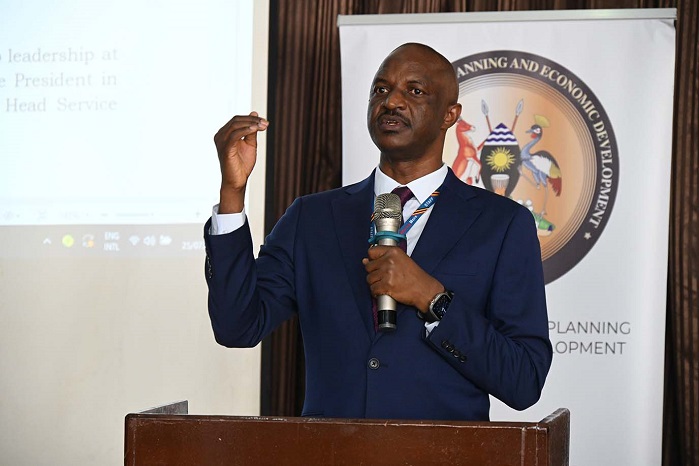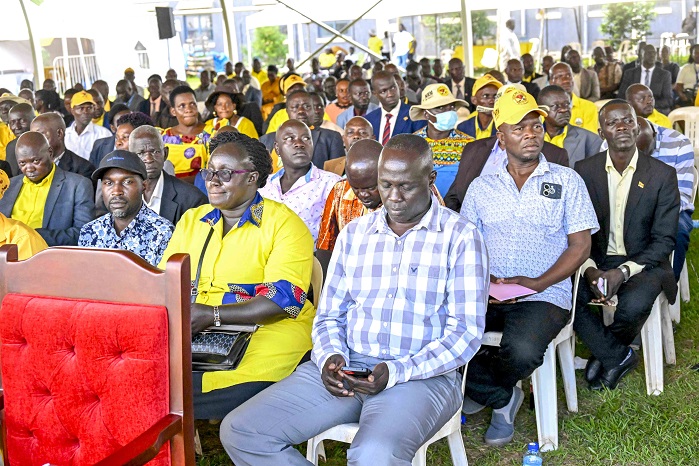
Ramathan Ggoobi the Permanent Secretary ministry of Finance addresseing Accounting Officers on Implementation of the Budget for FY 2024-2025 held at Imperial Royale Hotel in Kampala recently
HABARI DAILY I Kampala, Uganda I Absentee landlords, most of whom have opted to fence off their lands in Kampala and other cities could face wrath of the taxman if the proposal to tax their idle land is adopted.
The Commission of Enquiry on Land Matters, headed by Justice Catherine Bamugemereire in 2020 called for a tax on large tracks of privately-owned idle land across the country in order to encourage its productive use.
Responding to a suggestion by Haji Yunus Kakande, the permanent secretary, office of the President that idle land should be taxed in order to free up equity for the benefit of the entire economy, Ramathan Ggoobi, the secretary to the treasury, said that taxing idle land is one of the tax reforms Government has been fronting to boost economic growth.
“We are not saying that we should tax land because we are looking for a tax remedy. We only want to incentivize people of Uganda to use land for production. There is a lot of speculation on land. When you go around this city, you encounter many fenced off plots even in prime areas,” he said.

He made the comment during a meeting of Accounting Officers and permanent secretaries on the Implementation of the Budget for 2024/2025, held at Imperial Royale Hotel in Kampala recently.
Ggoobi said Uganda has some of the most expensive pieces of land in the world.
“There are some pieces of, actually not land, pieces of wetland that people want to steal from the Government. Do you know the price? Ten million dollars per acre. Do you know that ten million dollars can buy you a villa in Washington, D.C?,” he stated.
He said instead of making land a center of speculation, the Government wants to incentivise citizens to utilize the idle land so that they are able to subsidize the producers, produce taxable income to the Government and create revenue for those utilizing the land.
“That’s how countries develop. In those big cities in developed countries, they don’t allow you to own a piece of land that lies idle. They tax it. So to get rid of this problem, owners sell this land to those who can develop it. So the previous owner takes the money and buys an apartment somewhere else,” he said.

Ggoobi further said implementing a tax on idle land as one of several measures to increase equity in land ownership, improve transparency in land management, and reduce corruption in land transactions.
Vincent Bamugaya Tumusiime, the Director of Socio-economic Monitoring and Research in the Office of the President of Uganda, said the proposed a tax on idle land should be looked at as a means of incentivising landowners to make better use of their property.
“This would encourage land utilisation, prevent speculative accumulation of land, and compel landowners who cannot develop their land to release it to those who can,” he told reporters recently.
He said in a developing country aspiring to achieve middle-income status, it is deemed necessary to devise strategies to induce owners of such unutilised land to put it to productive use.
The proposed a tax on idle land as a means of incentivising landowners to make better use of their property is part of a national land policy that the Ugandan government drafted in 2009.
The policy aims to encourage land utilisation, prevent speculative accumulation of land, and compel landowners who cannot develop their land to release it to those who can. However, the proposed tax is yet to be implemented.
Alex Kamukama, a property developer, believes that unlocking the potential of unused land can have direct benefits and spillovers that can increase revenue for the country.

“There is a lot of unrealised economic potential in idle land. Besides becoming a den for thieves and host of diseases, the unutilized land denies the Government of tax,” he said.
Speaking about the Government’s intention to impose tax on disposal of non-business assets such as land, officials at the Kampala Associated Advocates said the proposed move was likely to result in a ripple effect on prices of land.
“Practically, the vendors will either increase (by grossing up) the price of the land to cover for the additional 5% tax. Therefore, the proposed tax will be transferred onto the buyer thereby increasing prices of land,” said the lawyers in a statement.
Under Clause 3 of the Income Tax (Amendment) Bill, 2024 Government sought to introduce a tax on the disposal of non-business assets at a rate of 5% on the profit made/gain from such disposal.
According to the World Bank, Uganda covers 241,040 square kilometers, of which 197,100 square kilometers are composed of land. Arable land comprises 27.4%, and 11.2% is in permanent crops, while only 0.1% of cropland is irrigated




